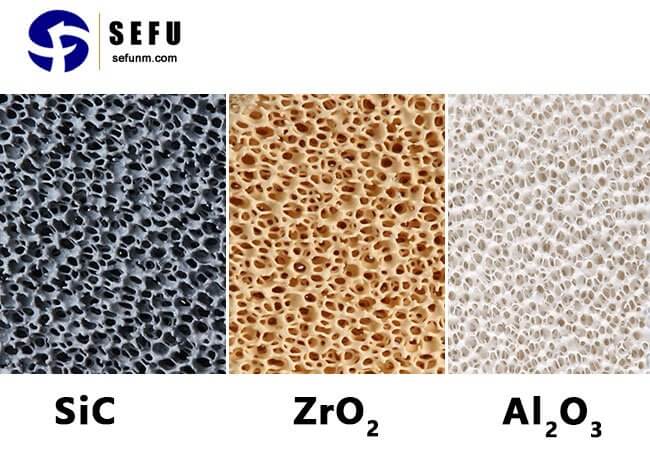Introduction
Aluminum casting is a widely used manufacturing process that involves pouring molten aluminum into a mold to create intricate shapes and components. To achieve high-quality castings, it is crucial to address various challenges, such as minimizing defects and impurities. One essential tool in the aluminum casting process is the ceramic foam filter, which plays a significant role in enhancing casting quality.
Ceramic foam filters are porous structures made of ceramic materials with an interconnected network of tiny pores. These filters act as a barrier, effectively removing impurities and ensuring the smooth flow of molten metal during the casting process. They are specifically designed to capture solid particles, such as oxides, slag, and non-metallic inclusions, thus preventing their entry into the mold.
Aluminum alloys are susceptible to various impurities that can negatively impact the final casting quality. Some common impurities include oxides, dross, flux, and non-metallic inclusions. These impurities can lead to defects like porosity, surface imperfections, and reduced mechanical properties. Ceramic foam filters effectively address these concerns by acting as a physical barrier that traps and removes impurities from the molten aluminum.
Ceramic foam filters are typically made of materials such as silicon carbide, alumina, or zirconia. These filters are available in various shapes, sizes, and pore structures to cater to different casting requirements. The interconnected pores within the filter allow molten aluminum to flow through while retaining solid impurities.

The ceramic foam filter’s structure also influences its filtration efficiency. Filters with finer pores can capture smaller particles, while larger pores allow for higher flow rates. Manufacturers can choose the appropriate filter based on the desired casting specifications and the size of impurities to be removed.
Advantages:
- The controlled flow of molten aluminum through the filter ensures uniform filling of the mold, minimizing turbulence and promoting solidification. This, in turn, reduces the formation of internal defects like shrinkage.
- By removing impurities, ceramic foam filters extend the lifespan of casting molds and reduce the need for rework or scrap. This leads to cost savings in the long run.
- Ceramic foam filters contribute to environmental sustainability by minimizing waste generation and reducing energy consumption during the casting process.
Ceramic foam filters find extensive application across various industries that rely on aluminum castings. Some notable examples include:
Automotive Industry: Aluminum castings are widely used in engine components, transmission cases, wheels, and other automotive parts. Ceramic foam filters ensure the high quality and performance of these critical components.
Aerospace Industry: Aluminum castings are employed in aircraft structural components, engine parts, and landing gear. Ceramic foam filters help achieve the stringent quality standards required in the aerospace sector.
Foundries: Foundries producing aluminum castings for diverse applications, such as consumer goods, machinery, and construction, benefit from ceramic foam filters to deliver high-quality castings.
Examples of Success
Automotive Manufacturing:
In an automotive engine block casting process, the implementation of ceramic foam filters resulted in a significant reduction in defects like porosity and inclusions. This improvement not only enhanced the mechanical properties of the engine block but also improved fuel efficiency and reduced emissions.
Aerospace Component Production:
A manufacturer of aircraft engine components incorporated ceramic foam filters into their casting process. The filters played a vital role in removing impurities, leading to a higher yield of defect-free components. This resulted in enhanced performance, increased reliability, and a reduced need for post-casting inspections.
Foundry Applications:
Foundry-producing aluminum castings for various industries implemented ceramic foam filters to meet their customers’ stringent quality requirements. The filters effectively eliminated impurities, resulting in a significant reduction in rejected castings. This led to cost savings, improved customer satisfaction, and increased market competitiveness.
Conclusion
Ceramic foam filters play a pivotal role in the aluminum casting process by enhancing casting quality and minimizing defects. The filters effectively remove impurities, resulting in improved mechanical properties, reduced scrap rates, and enhanced productivity. Industries such as automotive, aerospace, and foundries greatly benefit from the implementation of ceramic foam filters, ensuring the delivery of high-quality aluminum castings.
As the demand for superior cast components continues to rise, the utilization of ceramic foam filters becomes increasingly crucial. Manufacturers must understand the importance of filtration in aluminum casting and select the appropriate filters based on their specific casting requirements. With the aid of ceramic foam filters, the aluminum casting industry can achieve greater levels of precision, reliability, and efficiency, enabling the production of superior-quality castings for a wide range of applications.


